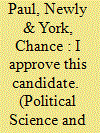| Srl | Item |
| 1 |
ID:
181014


|
|
|
|
|
| Summary/Abstract |
Concerns about electoral integrity have increasingly become the focus of political science analysis in recent years, but there has been very little systematic research on the strategic use of allegations of electoral wrong-doing for political advantage. Drawing on the literatures on legitimacy and electoral integrity, this paper develops a theoretical perspective on the strategic use of allegations of electoral impropriety for electoral ends, which, when such allegations are unjustified, constitutes a previously under-explored form of ‘meta-manipulation’. An original dataset, based on press reports from Turkey at the time of the 2014 local and June 2015 parliamentary elections, is used to test these hypotheses. The analysis shows that the governing party predominantly accused opposition parties of violent practices. The opposition parties, on the other hand, used allegations of electoral fraud and other forms of misconduct coupled with violence accusations against the governing party.
|
|
|
|
|
|
|
|
|
|
|
|
|
|
|
|
| 2 |
ID:
141822


|
|
|
|
|
| Summary/Abstract |
Contextual and strategic factors that influence the use of endorsements in political advertisements represent an underexplored area of the scholarly literature, resulting in a gap between the art and science of campaigning and the advertising-effects literature. This article uses data from the Wisconsin Ad Project to study endorsements in ads aired during the 2008 election cycle. We show that endorsements are used strategically by campaigns and that four factors—candidate characteristics, campaign characteristics, ad format, and timing—affect whether an ad containing an endorsement is aired. Specifically, endorsements are more likely to appear in positive ads, are primarily used by incumbents and female candidates, are less likely to appear in competitive races, and tend to air less frequently as a campaign progresses.
|
|
|
|
|
|
|
|
|
|
|
|
|
|
|
|
| 3 |
ID:
177283


|
|
|
|
|
| Summary/Abstract |
The article focuses on analyzing the ‘Cam Ranh policy’ of the Vietnamese government as well as the implementation of this policy since 2002 via its relations with major powers such as Russia, the United States and Japan. The article indicates that these great powers have a significant presence in Cam Ranh Bay. While the China factor is an important cause of American and Japanese interest in Cam Ranh, the traditional relationship with Vietnam and the Far East policy are the driving the choices of Russia in the region. Currently, Russia is the more favoured nation in Cam Ranh, however, with its close relationship with China after the Crimea crisis, the article recommends that Vietnam should consider rebalancing this factor by increasing the leverage with the US and Japan.
|
|
|
|
|
|
|
|
|
|
|
|
|
|
|
|
| 4 |
ID:
140024


|
|
|
|
|
| Summary/Abstract |
A growing sense among academics and policymakers alike is that the dominant issues of the twenty-first century will be decided in Asia-Pacific. But, the open question is how will these issues be decided: Who defines the rules of the game in the region and how? To address these questions, this paper studies the regulatory competition that is unfolding in the region. In particular, it examines the Trans-Pacific Partnership (TPP), with its potential to redraw the political-economic geography in Asia. Why is such a significantly path-breaking institution possible? This paper builds on the scholarship of international political economy and especially the literature on international institutions. It argues that this potential of the TPP crucially depends on the institutional environment in East Asia. A state of institutional anarchy enables the TPP to take hold in Asia. Important policy implications follow regarding the strategic use of international institutions.
|
|
|
|
|
|
|
|
|
|
|
|
|
|
|
|